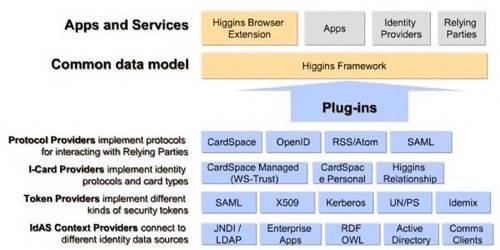An open source identity platform called the Higgins Project launched the 1.0 version of their service this week and it’s a nice look into what could be the future of user-centric identity online. Higgins offers a variety of features and services, but the basic premise is that it serves as a portable container you can use to carry multiple identities with you around the web.

Why would users want that? Because you don’t want to sign in to a social network with the same identity card you use to sign in to financial websites. Higgins aims to replace the assorted user names and passwords we all use today with a set of simple, standards-based identifiers that you can take from site to site.
Think of it like a wallet with different credit cards and forms of ID inside. Unfortunately, that’s only a metaphor and there’s nothing about Higgins that’s so easy to do today. Additionally, without a meaningful selection of sites that support the various protocols Higgins lets users leverage – then it’s pretty much a nonstarter. Let’s assume though that identity landscape is going to open up and that OpenID isn’t the only way it will do so. In that case, Higgins is a great idea and interested developers will likely find the project worth a look.
In addition to a browser plug-in for users, there’s libraries that site developers can make use of and an API that will let developers make use of the Higgins Global Graph (HGG) and a quite a few other things with even less hospitable acronyms. OpenID is at least intelligible and end users will not run away when they hear it said out loud.
RSS has changed the world because it is simple. OPML is fun to take to parties because anyone can learn the rules in minutes. I understand that security is by necessity more complex, but any party where as many acronyms show up as is the case with Identity (see below, for example) is not a party I look forward to attending.
The Real Value of Identity Diversification
That said, there is some comprehensible stuff here that’s clearly worth checking out. You may have stopped by someplace like SpreadOpenID.org and noticed that many OpenID vendors let users expose any of multiple “personas” when logging into a new site. Is that sufficient for security, though? Now that I see the Higgins vision explained, I do think that using one service for everything and trusting that single service to keep personas separated from each other is more trust than I care to put in anyone. To some degree, Higgins is asking you to put your trust in them instead, but the assertion is that you the user are in the driver’s seat.
I’m cheering for a clear, simple interface. Hopefully it will arrive sooner than it took the OpenID community to start to move in that direction. That said, I think there’s a lot of potential here in addition to the straightforward and compelling value proposition.
Below: The Higgins Interoperability Framework – don’t be scared, it’s ok.


















